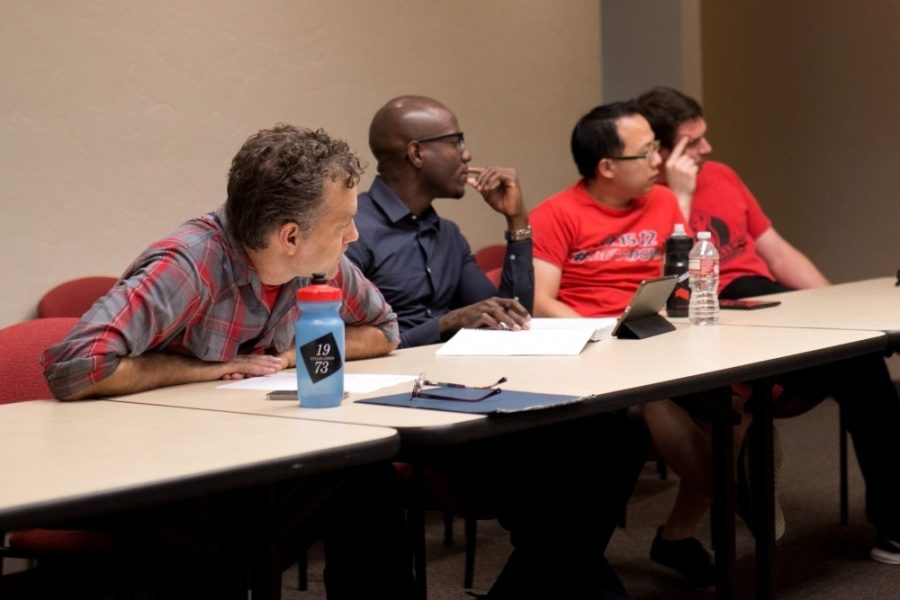UA’s Graduate and Professional Student Council convened their first general council meeting of the year on Jan. 23. at 6 p.m. in the Pima Room of the Student Union Memorial Center.
Jude Udeozor, GPSC president, presented a request that GPSC received to contribute funds to reimburse the organizers of the Inauguration Day Teach-in and March for last-minute tents bought due to weather conditions.
Jim Collins, GPSC treasurer, told the assembly the current budget does not provide a lot of latitude for unexpected funding requests, but supports contributing to this cause.
Daniel Kasper, GPSC assembly chair, motioned to find $250 of funds within the budget to provide to the Teach-In organizes. The General Council approved the motion 20-2.
Next, the council heard a presentation from UA’s advocacy director Mike Sistak and Jessie Baxter, GPSC’s legislative affairs director, concerning the university’s advocacy efforts this semester and the general legislative agenda.
Sistak informed the council of the aspect of Gov. Doug Ducey’s budget concerning funding for the public universities and the Arizona Board of Regents endorsement.
The regents plan to ask the state legislature for an additional $77 million for the next three years in order to fund half of in-state student tuition by 2020.
Sistak encouraged GPSC members to attend Wednesday’s Cats at the Capitol events to meet with and lobby state legislators to approve the funding. He also told GPSC members to inform their constituents and the community about AdvoCats’ email campaigns.
RELATED: Letter to the Editor: GPSC makes progress towards its goals
According to Sistak, Ducey’s budget should give UA a positive outlook for obtaining additional funding absent from previous legislative budgets.
Following Sistak’s presentation, Janis Gallego, student legal services advisor and Russ Johnson, Supreme Court chief justice of the Associated Students of the University of Arizona outlined the procedures followed by the court in preparation of GPSC incorporating the court into their constitution.
The ASUA Supreme Court provides advisory opinions, which provide interpretations of governing documents or settles election disputes.
The ASUA Supreme Court consists of five appointed students from the College of Law. The chief justice, working with Gallego, decides whether the court can and should hear a case and work to reduce conflicts of interest. The court hears oral arguments and reviews submitted briefs in order to release an opinion after closed-door deliberations.
All election complaints will first be considered by the elections commissioner. If an individual feels the commissioner took an incorrect action, the decision can be appealed to an election commission composed of three GPSC members not running for office or endorsing candidates. Their decision can be appealed to the Supreme Court.
After a series of high-profile election disputes settled by the GPSC executive board last semester, GPSC hopes to vote to transfer jurisdiction of election disputes to the ASUA Supreme Court next general council meeting in preparation for April elections.
The GPSC had previously discussed drafting a letter in support of Deferred Action for Childhood Arrivals students. Voto Latino does not believe the regents’ letter to President Donald Trump adequately supported DACA students at UA.
They requested that GPSC send a letter to the regents asking them to release a statement declaring UA a sanctuary campus, fail to cooperate with inquiring into the residence staff of individuals associated with the UA and bar any law enforcement agency from conducting immigration operations on campus.

Kasper said he hoped to present a letter at the next general meeting for council approval and supports the incorporation of Voto Latino’s requested language.
Kasper briefed the council on two current legislative bills directly affecting UA student which provide GPSC an opportunity to lobby the legislature.
HB 2260 requires students living in residence halls on campus to register to vote at their parents’ addresses . Kasper believes this is a direct attack on student voters, a group which usually votes heavily democratic. Kasper proposed the council draft a letter of opposition.
HB 2120 attempted to deny 10 percent of state aid to universities funding ethnic studies programs. The bill appears to have died before ever seeing a committee hearing, which promoted Kasper to suggest the council not release a statement.
GPSC Executive Vice President Danielle Blalock, suggested the council discuss ways to save money by reducing the stipends for and the positions retained on the executive board.
The council voted 17-4 to approve the scheduling of new elections. March 24 will be the deadline for application and all eligible candidates will be notified and allowed to campaign starting March 27. Voting will occur April 4 from 8 a.m. to 8 p.m. and results will be announced April 6.
Graduate students seeking a dual degree will currently only be able to vote for representatives from one of their college. The council plans to continue to work to change this aspect of the electronic voting system.
The council unanimously voted in favor of approving all non-controversial appropriation committee decisions concerning funding requests.
RELATED: GPSC Executive Board to write in support of DACA students, allow members to recuperate fall stipend
The council approved 12-5 to approve a funding request from the graduate student conference New Directions asking that unspent funds awarded to them last semester be provided to them this semester.
The council voted 11-3 to not approve a funding request from UA’s GeoClub to receive unspent funds from the previous semester because the council had already voted to provide their funds this year and the GPSC constitution bars clubs from applying for funding more than once a semester.
The council voted 16-2 to deny a request from the Singapore Students Association for GPSC to reimburse their $40 ASUA club recognition fee.
The meeting adjourned at 8:08 p.m. and was followed by an organization picture.
Follow Randall Eck on Twitter.









